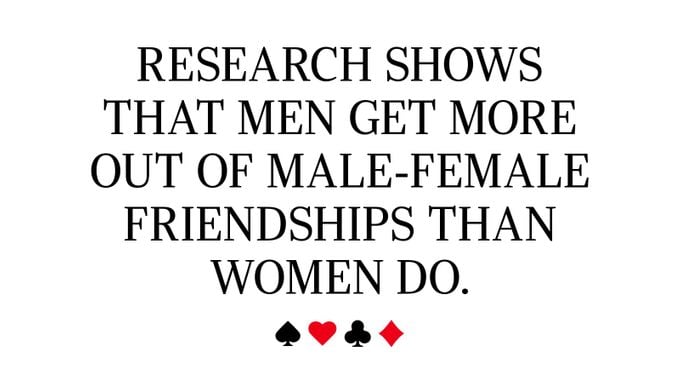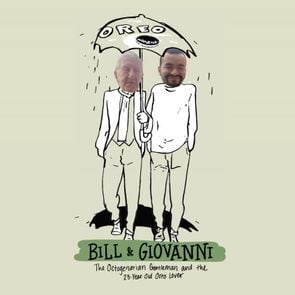The Importance of Men’s Friendships—and How Poker Could Make Them Stronger

People who make time to hang out with friends have all the luck
Years ago, I lived next door to a pessimistic older man named Steve, who told me he hadn’t had any friends since quitting his factory job 20 years earlier. The bowling league, happy hours and poker games had all withered. Steve sat on his porch all day.
Across the street was another neighbor, Werner. Weather permitting, Werner sat on a battered La-Z-Boy recliner he’d set up on his lawn. The two men, both around the same age, stared at each other but rarely talked. When Steve collapsed on his porch, Werner watched as the ambulance crew tried to revive him. I went to Steve’s funeral, a subdued event (there were just four of us, including a priest who hadn’t met him).
Steve and Werner are a handy metaphor for the kind of isolation that COVID-19 has visited upon many of us, an isolation that still lingers. Though we men were heading in that direction anyway: The percentage of males with at least six close friends fell by half between 1990 and 2021, according to the Survey Center on American Life.
What’s going on with men’s friendships?
Simply put, men are in a friend recession. Guys are gifted in the art of isolation, the result of social conditioning and 10,000 years of evolutionary forces, where cooperation has been offset by competition. The invention of the big-screen TV hasn’t helped.
And so, by middle age, we can find ourselves stranded. People move, we’re occupied with children and work. We’re tired, we’re distracted, we change. Then there’s our team mindset. A 2020 Oxford University study confirms what many guys will readily admit: Males prefer to socialize in groups rather than one-on-one. Groups are looser, less intimate. And shared activities often revolve around something—a sport, a bar, a fantasy football draft. But when the activity goes away, the group often goes with it.
I reconnected with an old friend who had played professional football, and I asked him if he was in touch with any of his former teammates. No, he said; when football ended, those connections did too. Without that central activity to sustain them, they all vanished from one another’s lives.
There was a time when card games or beer-league hockey or getting together to watch the Super Bowl was a sort of guilty pleasure, a vaguely senseless masculine activity. Now we’re learning that these things, or at least the connectedness they represent, are fundamental to mental health.
Poker: An anchor for men’s friendships
Twenty years ago, I was invited to join a poker game made up of writers, a few musicians, a lawyer, a media guy. We met monthly, and the game became a sort of oasis. There were literary quarrels, laughter, discussions about music and lots of stories. We didn’t socialize much outside the game. Spouses and children got a conversational nod but mostly remained in the background.
That game became part of the essential fabric of my life, and it evolved with the group. We used to start at 7 p.m. with a martini and play until 2 a.m. Now there are no martinis (a lot less alcohol of any kind), and we quit before midnight. The haze of cigarette smoke is long gone. The food is better—over two decades we’ve gone from chips and pretzels to sushi and homemade tarte Tatin. Two of our original players died and one moved away, but the game remains, with new players joining, a new society forming.
When the pandemic arrived, we switched to Zoom games. We downloaded a poker app on our phones and looked at those nine boxes containing our heads on our computer screens. The app dealt all nine players instantaneously, so the Zoom version galloped along much faster than the live version, where the dealer would laboriously shuffle and deal, or stop mid-deal to tell a story until someone finally barked, “Deal the damn cards.”
Despite the efficiency, the app presented problems. It took all our concentration to keep track, on multiple screens, of what was going on with each other and with the game. Conversational flow and easy banter didn’t really happen. It felt like any online poker game, the kind played with anonymous strangers.
Two of the guys eventually pulled out, saying they’d wait until we could get together in person. A couple of months later, when we finally reconvened for our live game after a two-year break, we rejoiced. We didn’t care that someone’s dog ate much of the food we’d put out. We didn’t mind the slow dealing, the stories and losing hands. It was just good to see everyone, to talk and to feel the comfort of the group.
The importance of male friendship
Isolation is a common factor in male suicide, particularly men who are middle-aged and older. It’s one reason their suicide rates are three times higher than those of women. According to Robin Dunbar, an evolutionary psychologist at Oxford University, women really do have more friends than men, and women’s relationships with their friends are more intense. Loneliness already played a role in men’s declining mental health, but the pandemic created more isolation, followed by a global spike in depression and anxiety.
Many people who have been working at home are staying put. Some offices are opening up again, but not everyone is going back, at least not full time. Those who are may find themselves in an almost empty office—often a lonelier feeling than working from home—and without the lunches with clients or after-work drinks with colleagues.
Even though getting together with other men is beneficial for mental health, in my experience there are limitations to men’s groups—the biggest one being that they just aren’t conducive to discussing emotional issues. At my poker game, we celebrate one another’s successes, but we rarely acknowledge failures or vulnerabilities. This can be taken to extremes. One of our guys died of cancer without telling any of us he was sick. We thought Bert looked a bit thin, a bit tired. Then he was gone.
A look at men’s friendships with women
In a 2018 article in the American Journal of Men’s Health about men’s social connectedness and mental health, the authors wrote that men often seek emotional connections outside of male groups. We look to women—wives, sisters, female friends—which allows us to maintain a “pattern of masculinity in public while seeking emotional support from women in private.”
The Oxford University study that observed that men like socializing in groups also noted that women prefer to socialize one on one. It’s a setting more conducive to discussing fears, vulnerabilities—getting really personal. Which is one reason friendships with women are the perfect complement to male friendships. I have a spouse to confide in, and a few female friends I regularly meet one-to-one for lunch.
The dynamic is much different from getting together with the guys, as much as I love doing that. When I am with my female friends, we talk about our children, work, the state of everyone’s health, our aging parents. We have a glass of wine and talk for two hours, and I emerge into the afternoon light, unburdened. I like to think they do too.
There isn’t much research on male-female friendship, but the research that does exist points out one perhaps obvious fact: Men generally get more out of male-female friendships than women do. Women already have female friends with whom to share feelings and fears. All they gain from us is the male perspective, which may not always be uplifting.
And there are issues with heterosexual male-female friendships, chiefly the potential for sexual tension. In a study published more than 20 years ago in the Journal of Social and Personal Relationships, women reported this as the least appealing aspect of having a male friend, while for men it was one of the main reasons to initiate a female friendship.
The research, while not new, supports the view made famous in When Harry Met Sally … . In the 1989 film, Billy Crystal says to Meg Ryan, “Men and women can’t be friends because the sex part always gets in the way.” Ryan asks if that means men can be friends only with women they don’t find attractive. Nope, Crystal answers, saying that men want to have sex with them too.
So there are risks to male-female friendships, which can, of course, be compounded by jealous partners (though not mine, thankfully). However, the rewards of cross-sex friendships, as researchers call them, are significant, at least for men.
I’m just really glad to have both types of friendships. I can meet my female friends for a nice lunch, a glass of wine, an unburdening. Then head off to poker.






